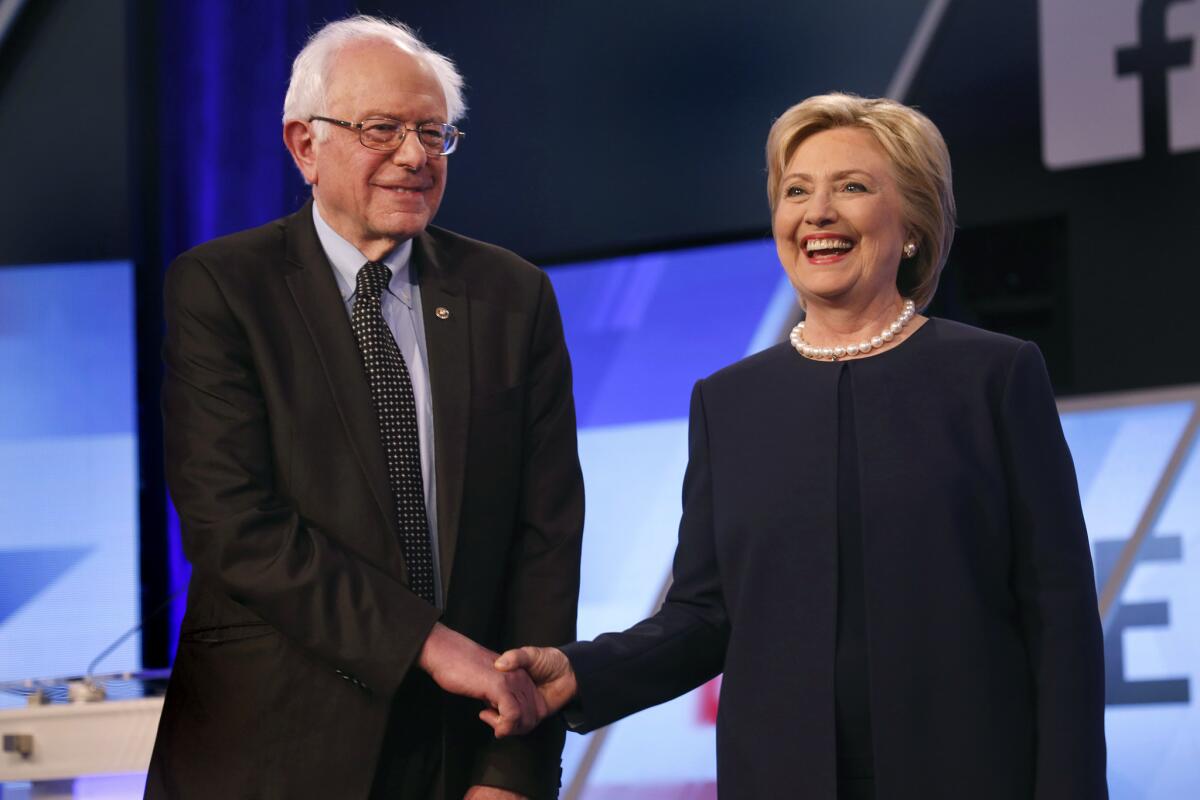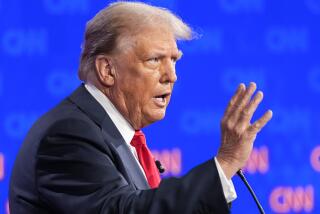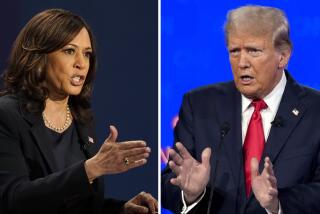Analysis: In debate, Hillary Clinton’s known negatives vie with Bernie Sanders’ unknown ones

Democratic presidential candidates Bernie Sanders and Hillary Clinton shake hands before the start of Wednesday’s debate in Miami.
The Democratic presidential debate Wednesday provided a clear view of two things that could provoke dread among the most avid party loyalists: the known negatives of Hillary Clinton and the mostly unknown negatives of Bernie Sanders.
A day after his surprise victory in Michigan, the Vermont senator had his best debate of the season, injecting both passion and humor into his responses and reminding the audience repeatedly of the main planks of his campaign. But he also stunned when, in a debate held in Miami, the capital of the Cuban diaspora, he refused to take back his long-ago praise of Fidel Castro.
In fact, he followed up that refusal by praising advances he said Cuba had made under Castro in healthcare and education. His 1985 remarks were shown on video, a reminder how swiftly such footage could be cut into a potentially devastating general election ad against the democratic socialist candidate.
Clinton came under repeated questioning by the moderators about her political weaknesses — many voters’ lack of trust in her, continuing controversy over her actions during the 2012 Benghazi, Libya, attack and her use of a private email system while secretary of State, and her more recent acceptance of large sums for speeches to Wall Street insiders.
Looking exasperated at times, she answered precisely as she has every other time she’s been asked those questions, but to see them strung together in the course of a two-hour debate was to anticipate the daily barrage she would face in a general election.
Voters in pending primaries will parse issue positions, their sense of the candidates’ authenticity and the rest, but they will also have to ponder how the negatives that arose would play out against a Republican opponent in November.
The timing and the location of the Wednesday debate, sponsored by the Spanish language network Univision, the Washington Post and Facebook, were acutely important. Next Tuesday, voters in Florida, Ohio, Illinois, North Carolina and Missouri will cast ballots. The Midwestern industrial primaries pushed the candidates to emphasize their plans for jobs; the Florida locale and the fact that the debate was televised in both Spanish and English led to a greater focus on immigration than in past meetings.
Both candidates said they would not deport any immigrants here illegally except criminals and terrorists — in effect breaking with President Obama, who has been criticized by Latinos for high levels of deportations during his presidency. The emotional peak of the debate occurred when a Spanish-speaking woman, her five children sitting beside her, told the candidates about the deportation three years ago of her husband.
Sanders’ exchange over Cuba was topical because of Obama’s visit to the island nation later this month, eight months since the U.S. reestablished diplomatic ties after a half-century breach. After Clinton said that she would, if elected president, visit with dissidents in Cuba, and Sanders called for full reinstatement of relations, the debate moderators played a 1985 video of a shaggy-haired Sanders.
“You may recall way back in, when was it, 1961, they invaded Cuba, and everybody was totally convinced that Castro was the worst guy in the world. All the Cuban people were going to rise up in rebellion against Fidel Castro,” Sanders was seen saying. “They forgot that he educated their kids, gave them healthcare, totally transformed their society.”
Sanders was asked if he regretted the comment.
“The key issue here was whether the United States should go around overthrowing small Latin American countries,” Sanders said. “I think that that was a mistake.”
“You didn’t answer the question,” said Univision anchor Maria Elena Salinas.
Sanders went on to say that he hoped Cuba would become democratic, but that under its current leaders it had made advances.
Clinton returned to the subject during her next turn and — clearly aware of the contents of the video — said that Sanders had in an unaired section “praised what he called the revolution of values in Cuba.”
“If the values are that you oppress people, you disappear people, you imprison people or even kill people for expressing their opinions, for expressing freedom of speech, that is not the kind of revolution of values that I ever want to see anywhere,” she said, to the crowd’s applause.
Election 2016 | Live coverage on Trail Guide | Track the delegate race | Sign up for the newsletter
But if that was a well-finessed comeback by Clinton, it occurred after she had been battered by both Sanders and the questioners.
The very first question put to her asked about her failure to win in Michigan on Tuesday; Clinton didn’t deliver an answer as to why she came in second.
She was asked about her speeches to Wall Street employees and whether they suggested too cozy a relationship. She replied by saying her economic plan was the toughest against Wall Street; Sanders replied with a zinger: “Clearly, the secretary’s words to Wall Street has really intimidated them, and that is why they have given her $15 million in campaign contributions.”
In an uncomfortable exchange, Clinton was shown a video of the mother of one of the four Americans killed in Benghazi during the attack on the diplomatic mission there. The woman said that U.S. officials including Clinton had told her the attack was a response to a video, “when they knew it was not the video” that caused the attack but a separate terrorist action.
“Secretary Clinton, did you lie to them?” asked questioner Jorge Ramos.
Clinton replied that, while she was sympathetic to the woman’s grief, “she’s wrong, she’s absolutely wrong.” She noted that multiple congressional investigations, including one that required more than 11 hours of testimony from her, have uncovered no wrongdoing.
See more of our top stories on Facebook >>
“We have captured one of the lead terrorists, and he admits it was both a terrorist attack and it was influenced by the video,” Clinton said. “This was fog of war. This was complicated. The most effective, comprehensive reports and studies demonstrate that.”
The debate also demonstrated, however, that comprehensive reports and studies will not put questions about Clinton to rest. Nor will Sanders’ calls for political revolution deliver all the answers about a politician whose background remains little-known by many voters.
But voters will get the call, again next Tuesday, about which option seems more palatable.
For political news and analysis, follow me on Twitter: @cathleendecker . For more on politics, go to latimes.com/decker.
MORE ON CAMPAIGN 2016
‘What do you want in your next president?
Ohio’s GOP primary may be a last chance — to save Kasich, and blunt Trump
Tough debate questions, especially for Clinton, after her surprise loss to Sanders in Michigan
More to Read
Get the L.A. Times Politics newsletter
Deeply reported insights into legislation, politics and policy from Sacramento, Washington and beyond. In your inbox three times per week.
You may occasionally receive promotional content from the Los Angeles Times.











